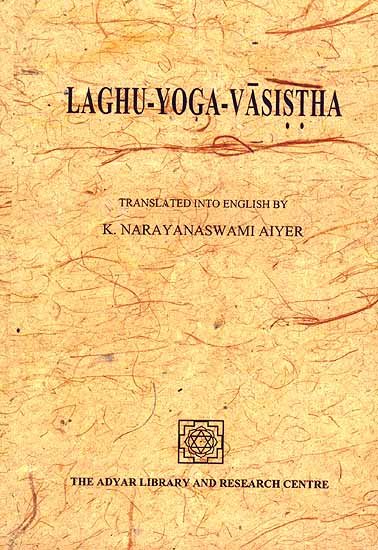Laghu-yoga-vasistha
by K. Narayanasvami Aiyar | 1896 | 137,618 words | ISBN-10: 818514141X | ISBN-13: 9788185141411
This page relates “the story of the bilva fruit”, the 3rd part of chapter 6 of Laghu-yoga-vasistha (English translation). This ancient Sanskrit book contains epic legendry (similair to puranas and itihasa) and deals with the Advaita-vedanta (non-dual) branch of Indian philosophy. It is authored by sage (rishi) Valmiki and condensed (laghu) from an even larger work, forming a discourse between Vasistha (Vasishtha) and Rama. This part is included in the chapter “nirvana-prakarana”.
Part 3 - The Story of the Bilva Fruit
Summary. In this story, an illustration is given that the expansion of the Bliss arising from the worship of Jñāna stated in the previous story is the All.
Rāma continued: “The nectar showers of thy words, though they have become full in me, are not yet to my heart’s content. Please therefore throw more light on this all-full Jñāna.”
To which the Muni replied: “One thing which is sweet and pleasant to us at one moment produces the very reverse of that sensation in another. Whoever has not experienced this in this world? Things, when longed for, are pleasant; but are bitter if not longed for. Hence desires are the cause of pleasures. Pleasures will cease, when satis faction arises in the same. But if desires cease, all else will be destroyed. Therefore, Oh Rāma who wishes to divest thyself of all associations with objects, mayest thou be free from all desires, from all thoughts, from thy (lower) mind. If thy Antaḥkaraṇa (lower mind) be devoid of all Vāsanās, then it will be never disturbed from its equilibrium, in spite of the many obstacles crossing its path.
The mind has the potency of creating or undoing the whole world in the twinkling of an eye. Therefore mayest thou slay this mind, either through the destruction of the Vāsanās or the control of the Prāṇa. The base Avidyā (ignorance) has the property of expanding and contracting. Through these two (expansion and contraction), the ever-gyrating Karmas do take life and die. Therefore thou shouldst annihilate this mind of Ajñāna (ignorance) through the power of constant association with Ācāryas and Jñāna books.
The mind is destroyed by the control of Prāṇa or the arrest of the fluctuation of the mind Such a distraction is termed by the wise to be the supreme state. The Bliss which arises, when the visible things and sight are merged into one (the seer), is the all-pervading Paramārtha (Reality). Beyond ‘That’, naught else is. Through such a vision (or direct perception), the mind will be destroyed and will generate infinite bliss. Such bliss has no increase or decrease, no appearance or disappearance. The mind of the discriminative Jñānis cannot be termed mind, but only Tattva (Reality). That which gets differentiated through the diverse objects is the mind. It will become immaculate, like copper transmuted into gold. This Reality of Jñāna, having become the mind, will sport once in this universe and then reaching the Turya (fourth) state will become that Eternal Verity which is above Turya. Hence Brahman can be one as well as many like this variegated cosmos. All are Brahman only. The differentiations of the mind, etc., do not in the least really exist and will appear as so many manufactured illusions of the brain. Now I will illustrate the same. Listen, Oh Rāma, to a small anecdote which will astonish even the learned.
There is a Bilva fruit, of such huge dimensions that neither Koṭis (crores) nor Mahā-koṭis, nor lakhs [= hundreds of thousands] of Koṭis of Yojanas can measure it. It will not decay even when a Mahā-kalpa closes. Though the ancient of ancients, its glory is such that it is more soft and delicious than the moon on the third day of the waxing fortnight. It will remain quite unruffled even amidst the fierce storms and gales at the end of a Kalpa and is the seed of Brahmā’s egg. It is indeed impossible to set a limit to the number of mundane eggs which generate out of, and are absorbed in, this fruit to which no words can do full justice. Though ripe ever, it will never decay. It is the quintessence in full of all other fruits. The fleshy part of this fruit is illimitable and typifies but the all-pervading nature of Jñāna. The marrow in the fruit is the fluctuating Chit-śakti which, arising in the fruit (of Brahman) that is equal in all, produces, through its intelligential potencies, the heterogeneities of Ākāśa, the Kalās (parts) the imperishable Law, motion, the dome of Brahmā’s egg, of time, the several quarters, etc., which are represented by the different seats of marrow in the fruit.”
Rāma, at this statement of Vasiṣṭha, said: “Oh first of Jñānis, I have understood thy allegory of Bilva fruit. Oh Ācārya, this Bilva fruit is no other than the supreme state of the Sat of Jñāna. Ahaṃkāra and others are no other than the base aspects of Jñāna. Oh firm Ācārya, Jñāna which appears as the one and the many, has never any differences per se. The marrow of the pumpkin of Brahmā’s egg is Mahā-Meru[†], etc., while the marrow of the Bilva fruit of Jñāna is no other than Brahmā’s egg and all the universes.”
[*] The fruit of a tree commonly called Bel (Aegle marmelos), and spherical in shape.
[†] The central axis or column of man as well as universe.
